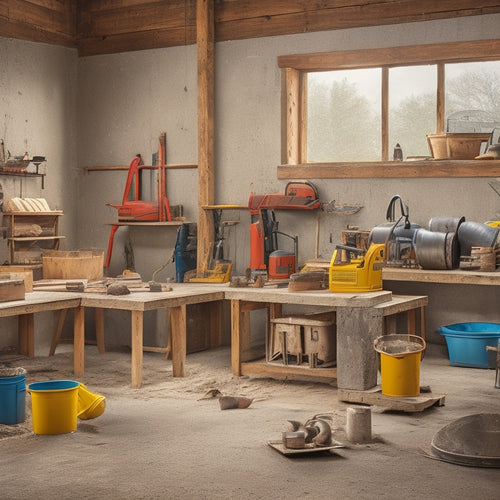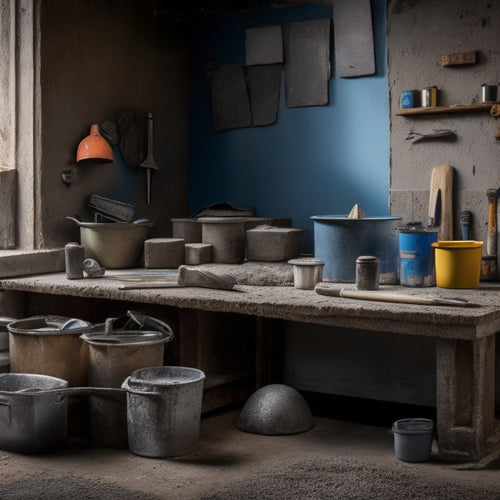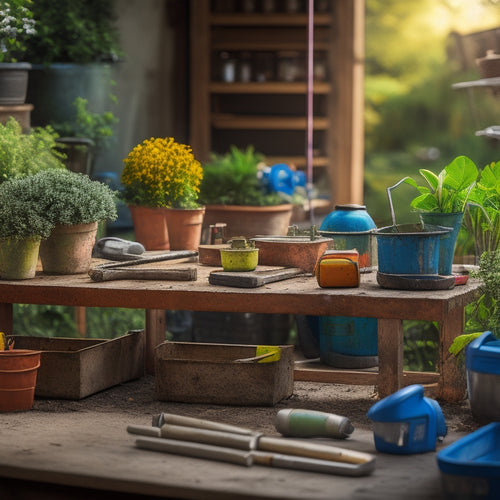
What Tools Smooth Concrete Floors Best
Share
You'll need a range of tools to smooth concrete floors effectively. Essential hand tools like trowels, floats, and edgers provide precision control, while power trowels and grinders accelerate the process. Specialized edging and corner tools help navigate irregular surfaces, and heavy-duty grinding and polishing equipment tackles large areas. Finally, advanced finishing and sealing tools, including densifiers and polishing pads, enhance the final result. From prep to finish, the right tools make all the difference – and understanding their roles is vital to achieving a high-quality, smooth concrete floor that meets your standards, so let's take a closer look.
Key Takeaways
• For precise control and comfort, use a trowel with a curved blade and ergonomic handle to smooth concrete floors.
• Power trowels with rotating blades are ideal for large areas, providing consistency and precision in flattening and smoothing concrete.
• Edging tools, such as corner edgers and precision edgers, help achieve smooth, even edges and corners on concrete floors.
• For heavy-duty grinding and polishing, use walk-behind, ride-on, or handheld grinders with diamond grinding tools to achieve a high-gloss finish.
• Advanced finishing and sealing tools, including densifiers, sealing products, and polishing pads, enhance the strength and appearance of smooth concrete floors.
Essential Hand Tools for Smoothing
You'll need a set of essential hand tools to effectively smooth concrete floors, starting with a trusty trowel, which serves as an extension of your arm to apply and spread concrete mix. A trowel's curved blade and ergonomic handle allow for precise control and comfortable use during long periods of work.
Next, you'll need a float, which helps to flatten and smooth the concrete surface. Its flat, wide blade and long handle provide the necessary leverage to cover large areas efficiently.
To achieve a high-gloss finish, incorporate edging and finishing tools into your smoothing techniques. A hand edger, with its straight or curved blade, is perfect for creating sharp, defined edges and corners. A finishing trowel, with its smaller, more precise blade, is ideal for adding the final touches to your concrete floor.
Proper tool maintenance is vital to extend the life of your hand tools. Regularly clean and store them in a dry place to prevent rust and damage.
Power Tools for Fast Results
When you've mastered the art of hand tooling, it's time to amplify your smoothing capabilities with power tools that can greatly reduce labor time and effort while producing exceptional results.
Power tools are designed to tackle large areas and heavy concrete mixes, making them ideal for commercial or high-volume projects.
One of the most essential power tools for smoothing concrete floors is the power trowel. These machines are equipped with rotating blades that help to flatten and smooth the concrete surface.
They're particularly useful for large, open areas where manual labor would be too time-consuming.
Additionally, power trowels can be used in conjunction with concrete mixers to guarantee a consistent, high-quality finish.
By using a power trowel to spread and smooth the concrete, you can achieve a level of precision and uniformity that would be difficult to achieve by hand.
With the right power tools, you'll be able to work more efficiently and produce professional-grade results.
Specialized Edging and Corner Tools
To achieve a professional finish, it's essential to use specialized edging and corner tools that can reach into tight spaces and navigate curved or irregular surfaces with precision. When working on concrete floors, you'll encounter areas that are difficult to access with standard power tools. That's where edging and corner tools come in. These specialized tools are designed to help you achieve smooth, even edging techniques and corner finishes that are free of imperfections.
You'll find that edging tools come in various shapes and sizes, each suited for specific tasks. For instance, you can use an edger with a curved blade to smooth out rounded edges, or a corner edger with a 90-degree angle to get into tight corners. These tools allow you to work with precision, ensuring that your concrete floor has a seamless finish.
Heavy-Duty Grinding and Polishing
Six heavy-duty grinding and polishing tools are essential for refining the surface of your concrete floor, each designed to tackle specific stages of the process.
You'll need a walk-behind grinder for large areas, a ride-on grinder for maximum efficiency, and a handheld grinder for tighter spaces.
A concrete planer is necessary for removing old coatings and preparing the surface for resurfacing.
Diamond grinding tools, such as cup wheels and diamond discs, are used for aggressive grinding and polishing.
A terrazzo grinder is ideal for polishing and refining the surface, while a burnisher is used for the final high-gloss finish.
When it comes to concrete resurfacing, these heavy-duty tools are vital.
You'll use them to remove imperfections, smooth out the surface, and achieve a high-quality finish.
Diamond grinding, in particular, is effective for removing old coatings, grinding down high spots, and polishing the concrete to a high shine.
Advanced Finishing and Sealing Tools
With your concrete floor resurfaced to a high shine, you'll now turn your attention to advanced finishing and sealing tools that will protect and enhance its appearance.
These tools are essential in achieving a durable and aesthetically pleasing finish.
To take your concrete floor to the next level, you'll need to master various finishing techniques. This is where advanced tools come into play.
Here are some essential tools to take into account:
-
Densifiers: These products penetrate the concrete to fill in pores, increasing its density and strength.
-
Sealing products: Choose from a range of sealers, including acrylic, polyurethane, and epoxy, to protect your floor from stains and damage.
-
Finishing compounds: Apply these to fill in small scratches and imperfections, leaving a smooth, even surface.
-
Polishing pads: Use these to achieve a high-gloss finish or to remove minor scratches.
-
Edge grinders: Perfect for detailing edges, corners, and tight spaces where larger equipment can't reach.
Frequently Asked Questions
How Often Should I Clean My Concrete Floor During the Smoothing Process?
During the smoothing process, you should clean your concrete floor regularly to prevent dust buildup and guarantee even finishing; aim for a cleaning frequency of every 1-2 hours, following maintenance tips like sweeping and mopping to achieve ideal results.
What Safety Gear Is Necessary When Working With Power Tools on Concrete?
When working with power tools on concrete, you'll need safety gear like safety goggles to protect your eyes from debris and noise protection, such as earmuffs, to prevent permanent hearing damage from loud machinery.
Can I Smooth a Concrete Floor That Has Already Been Sealed or Coated?
If you've already sealed or coated your concrete floor, you'll need to contemplate sealing options or coating removal before smoothing; otherwise, you'll risk damaging the existing finish or compromising the smoothing process.
How Do I Determine the Best Grit Sequence for My Project?
When determining the best grit sequence for your project, you'll need to take into account project requirements, such as the desired finish and floor condition, to select the ideal grit selection, ensuring a smooth and efficient process.
Will Smoothing a Concrete Floor Increase Its Load-Bearing Capacity?
You're wondering if smoothing a concrete floor will give it a strength boost, but here's the surprising truth: it won't directly increase the load capacity, but it will improve the surface integrity, making it more durable and resistant to cracks.
Conclusion
You've made it to the finish line, and your concrete floor is now silky smooth!
With the right tools, you've tamed the beast, transforming it from a rough, rugged surface to a glossy, showroom-worthy floor that'll make everyone's jaw drop.
You've got the skills, the know-how, and the arsenal of tools to take on any concrete floor that comes your way – and conquer it with ease!
Related Posts
-

What Tools to Rent for a Concrete Home Reno
When tackling a concrete home renovation, you'll need to rent a variety of specialized tools to get the job done. For...
-

Top Tools for Beginners in Concrete Masonry Coating
You're about to begin a concrete masonry coating project, and having the right tools is essential. Start with essenti...
-

Must-Have Tools for Concrete Planter Projects
As you commence your concrete planter project, you'll need a range of specialized tools to achieve professional-grade...


